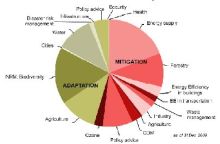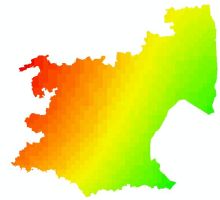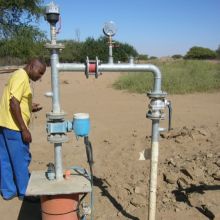People, policy and climate change predictions in Mpumalanga: Local solutions for global challenges
|
- Dr Dave Thompson, Biodiversity Scientist, SAEON Ndlovu Node
The impacts of climate change are current and more severe than previously thought (IPCC 2007). They pose an increasingly serious risk to ecosystems and ecosystem services, food security and the realisation of sustainable development.
No part of the globe - whether developed or developing; rich or poor - is without impact. In acknowledging the seriousness of climate change, the South African Government approved the framework for the development of a National Climate Change Response Policy in July 2008.
It is against this backdrop that provincial and local governments are responsible for incorporating mandates that deliver on both climate change adaptation (measures taken to reduce the vulnerability of natural and human systems to actual or expected climate change effects, ~ coping with the effects of…) and climate change mitigation (measures to reduce the sources or enhance the sinks of greenhouse gases, ~ reducing the effects of …) into their respective policy frameworks, and to develop appropriate strategies for which they are legislatively responsible (Figure 1).
Climate change response strategies
One of the biggest challenges in developing such climate change response strategies, at least during the preliminary phases, is the divide that exists between science and policy. The tragic significance of this 'information gap' is that the majority of people remain unaware, misinformed and therefore somehow removed from the reality of the local and global causes and consequences of climate change.
Recently the author was invited to participate in a number of information-sharing forums organised within the various levels of the Mpumalanga provincial government. The first of these forums was a workshop facilitated by the Mpumalanga Tourism and Parks Agency (MTPA) that brought together experts from various academic (University of Pretoria), research (Agricultural Research Council; Council for Scientific and Industrial Research; SAEON) and governmental agencies (Department of Economic Development, Environment & Tourism; Department of Environmental Affairs; Ezemvelo KZN Wildlife; MTPA; South African National Biodiversity Institute) in order to promote knowledge-sharing and to capacitate the MTPA across the board.
Discussions ranged from defining climate change (as opposed to global warming or global change) and down-scaled temperature and precipitation predictions for Mpumalanga (Figure 2), through the probable impacts on regional biodiversity, to the contribution of the tourism industry to the climate crisis and carbon-stock trading. The author led discussions during which he unpacked the role of scientists in helping to bridge the science-policy gap and outlined the value of education and public participation or 'citizen science' activities in personalising climate change for the man on the street.
Mpumalanga Climate Change Response Strategy
After two days of dialogue, participants informed the drafting of the Mpumalanga Climate Change Response Strategy. The rationale behind this strategy is to provide a framework for the coordination of provincial responses to establish, monitor, mitigate and adapt to the impacts of climate change in Mpumalanga.
A variety of key themes, each with different areas of implementation and responsibility, are identified in the draft strategy and are grouped into three overarching strategies under the MTPA mandate. These strategies are
- Tourism & Corporate (Internal),
- Awareness & Outreach (External) and
- Biodiversity Vulnerability (Biodiversity).
Effective and sustainable achievement of the 'Mitigation / Adaptation' mandate is reliant on collaboration, and the SAEON Ndlovu Node will continue to work in partnership with MTPA, the University of Pretoria, and others, to ensure that these policies become practice. People wishing to know more about the MTPA Mpumalanga Climate Change Response Strategy are encouraged to contact Mervyn Lötter, Manager for Biodiversity Planning MTPA.
More recently, the South African Local Government Association (SALGA), with the support of the German Technical Co-operation (GTZ) and the Mpumalanga Rural Development Programme (MRDP) invited councillors and other representatives from municipalities in Mpumalanga to a Local Government Summit on Climate Change. Specifically, the Summit aimed to increase awareness of municipalities to 'on the ground' climate change issues and vulnerabilities, and to provide tools and advice on how to integrate climate change adaptation and mitigation into their respective development planning processes.
Over a two-day period a panel of invited experts - comprising researchers (Climate Systems Analysis Group UCT; School of Bio-resources, Engineering and Environmental Hydrology UKZN; SAEON; local industry representatives (Eskom; SAPPI; SASOL) and both national governmental (Department of Environmental Affairs; MTPA) and international non-governmental (ICLEI Africa; GTZ) agents - tackled the complexities of climate change, the value of knowledge-sharing and its implication for, inter alia, food and water security (Figure 3), biodiversity, disaster management, local industry and economic development.
Presentations by the experts led to open-floor discussions on the truths of climate change, engaging the public, the value of audience-specific working messages, climate-friendly technologies, the sustainability vision of industry, and case studies of global cities, towns and municipalities that have successfully adopted climate-informed mandates. Again, the information gap’ between the various stakeholders was revealed as the major stumbling block in preventing informed decision making at the local scale, and highlighted the need for aggressive and ongoing outreach activities and training workshops (Figure 4).
Climate-prepared municipalities
By way of the next step in the process of achieving 'climate-prepared' municipalities, three local Mpumalanga commissions - each representing different districts - were selected as candidate subjects. MRDP and GTZ will now work with the local governments in order to promote an understanding of climate change within the respective municipalities, to develop an understanding of their vulnerability to climate change, and to implement tailor-made strategies to mitigate and adapt to climate change at the local scale. In so doing, the districts of Ehlanzeni, Gert Sibande and Nkangala will serve as examples to other municipalities in South Africa, and will join a worldwide movement of over 1 200 local governments (representing 400 million people) committed to sustainability.
The author will continue to work in partnership with MRDP and GTZ in empowering the communities in Mpumalanga. People wishing to know more about the activities of the MRDP and GTZ should email Michelle Terblanche or Shirley Masemola.













